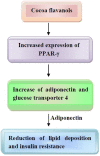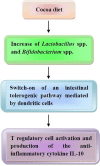Cocoa and Dark Chocolate Polyphenols: From Biology to Clinical Applications
- PMID: 28649251
- PMCID: PMC5465250
- DOI: 10.3389/fimmu.2017.00677
Cocoa and Dark Chocolate Polyphenols: From Biology to Clinical Applications
Abstract
It is well known that cocoa and dark chocolate possess polyphenols as major constituents whose dietary consumption has been associated to beneficial effects. In fact, cocoa and dark chocolate polyphenols exert antioxidant and anti-inflammatory activities switching on some important signaling pathways such as toll-like receptor 4/nuclear factor κB/signal transducer and activator of transcription. In particular, cocoa polyphenols induce release of nitric oxide (NO) through activation of endothelial NO synthase which, in turn, accounts for vasodilation and cardioprotective effects. In the light of the above described properties, a number of clinical trials based on the consumption of cocoa and dark chocolate have been conducted in healthy subjects as well as in different categories of patients, such as those affected by cardiovascular, neurological, intestinal, and metabolic pathologies. Even if data are not always concordant, modifications of biomarkers of disease are frequently associated to improvement of clinical manifestations. Quite interestingly, following cocoa and dark chocolate ingestion, cocoa polyphenols also modulate intestinal microbiota, thus leading to the growth of bacteria that trigger a tolerogenic anti-inflammatory pathway in the host. Finally, many evidences encourage the consumption of cocoa and dark chocolate by aged people for the recovery of the neurovascular unit.
Keywords: anti-inflammatory activity; cocoa; dark chocolate; flavanols; nitric oxide; polyphenols; reactive oxygen species; transcription factors.
Figures




Similar articles
-
Cocoa Polyphenols and Gut Microbiota Interplay: Bioavailability, Prebiotic Effect, and Impact on Human Health.Nutrients. 2020 Jun 27;12(7):1908. doi: 10.3390/nu12071908. Nutrients. 2020. PMID: 32605083 Free PMC article. Review.
-
Antioxidant activity and polyphenol and procyanidin contents of selected commercially available cocoa-containing and chocolate products in the United States.J Agric Food Chem. 2006 May 31;54(11):4062-8. doi: 10.1021/jf060290o. J Agric Food Chem. 2006. PMID: 16719535
-
Effects of Cocoa Polyphenols and Dark Chocolate on Obese Adults: A Scoping Review.Nutrients. 2020 Nov 30;12(12):3695. doi: 10.3390/nu12123695. Nutrients. 2020. PMID: 33266002 Free PMC article.
-
Survey of commercially available chocolate- and cocoa-containing products in the United States. 2. Comparison of flavan-3-ol content with nonfat cocoa solids, total polyphenols, and percent cacao.J Agric Food Chem. 2009 Oct 14;57(19):9169-80. doi: 10.1021/jf901821x. J Agric Food Chem. 2009. PMID: 19754118
-
Effects of dark chocolate on endothelial function in patients with non-alcoholic steatohepatitis.Nutr Metab Cardiovasc Dis. 2017 Nov 13;28(2):143-149. doi: 10.1016/j.numecd.2017.10.027. Nutr Metab Cardiovasc Dis. 2017. PMID: 29329924 Clinical Trial.
Cited by
-
Cocoa Polyphenols and Gut Microbiota Interplay: Bioavailability, Prebiotic Effect, and Impact on Human Health.Nutrients. 2020 Jun 27;12(7):1908. doi: 10.3390/nu12071908. Nutrients. 2020. PMID: 32605083 Free PMC article. Review.
-
Association between energy-adjusted dietary inflammatory index and sleep quality disorders: a cross-sectional study on fasa adult cohort.J Health Popul Nutr. 2025 Jul 5;44(1):239. doi: 10.1186/s41043-025-00998-w. J Health Popul Nutr. 2025. PMID: 40618166 Free PMC article.
-
Chocolate, "Food of the Gods": History, Science, and Human Health.Int J Environ Res Public Health. 2019 Dec 6;16(24):4960. doi: 10.3390/ijerph16244960. Int J Environ Res Public Health. 2019. PMID: 31817669 Free PMC article. Review.
-
Inflammatory Microenvironment and Adipogenic Differentiation in Obesity: The Inhibitory Effect of Theobromine in a Model of Human Obesity In Vitro.Mediators Inflamm. 2019 Jan 20;2019:1515621. doi: 10.1155/2019/1515621. eCollection 2019. Mediators Inflamm. 2019. PMID: 30804705 Free PMC article.
-
The Effect of Bioactive Aliment Compounds and Micronutrients on Non-Alcoholic Fatty Liver Disease.Antioxidants (Basel). 2023 Apr 10;12(4):903. doi: 10.3390/antiox12040903. Antioxidants (Basel). 2023. PMID: 37107278 Free PMC article. Review.
References
-
- Russo MA, Sansone L, Polletta L, Runci A, Rashid MM, De Santis E, et al. Sirtuins and resveratrol-derived compounds: a model for understanding the beneficial effects of the Mediterranean diet. Endocr Metab Immune Disord Drug Targets (2014) 14(4):300–8.10.2174/1871530314666140709093305 - DOI - PubMed
Publication types
LinkOut - more resources
Full Text Sources
Other Literature Sources

